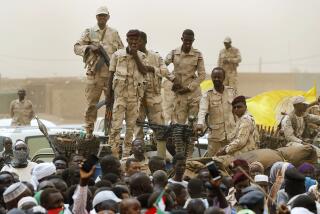Sudanese Rebels Will Bar Relief Agencies Operating Under Government Auspices
- Share via
ADDIS ABABA, Ethiopia — The leader of rebels in southern Sudan says his forces will bar international relief agencies operating in the area under the auspices of the Sudanese government.
“If they are there under our auspices, we will protect them,” John Garang said in an interview during a visit to the Ethiopian capital. “But when they are working for the other side . . . they are there at their own risk.”
Spokesmen for some of the 10 to 15 relief organizations in southern Sudan, however, said it was out of the question to work through the Garang’s Sudanese People’s Liberation Army (SPLA).
“That would be a ludicrous thing to do,” said one, speaking only on condition that neither he nor his agency be identified. “If we worked through them we’d be kicked out of Sudan.
“It’s gotten dicier there in the past year with the kidnapings and shooting down of airplanes. But doing business with the SPLA is not an option right now.”
Breadbasket Hit Hard
Food supplies in Sudan, once considered a breadbasket for North Africa and the Middle East, have been hit hard by Garang’s four-year rebellion, which has forced thousands of peasant farmers to abandon their land.
Garang said that late rains and poor crops this year had further aggravated the food situation in southern Sudan and that could mean famine conditions for more than 6 million people living in the area.
There are also an estimated 230,000 people who have been displaced by the violence and are totally dependent on food aid, according to the United Nations Food and Agriculture Organization in Rome and Western relief agencies.
Garang’s followers took up arms against the government in Khartoum in 1983 in a fight for more autonomy for those in the mainly Christian south and an end to Islamic laws favored by the dominant Muslims of the north. Garang said his aim now is to bring down the Khartoum government.
Westerners Seized
His guerrillas seized four Western aid workers on July 7, and he said that more abductions are likely. But he claimed that the Briton and three Americans taken from Mundri and still held were seized for their own protection.
Garang claimed that his forces controlled the entire southern Sudanese countryside, an area about the size of Texas. He said his fighters had isolated the southern provincial capital of Juba and were pushing north into Sudan’s central Kordofan District.
Food convoys of international aid groups working through the Sudanese government are accompanied by army escorts. Garang urged the aid groups to operate only through the rebels for their own safety.
“We are the government in the south,” Garang said. “Humanitarian efforts should through us.”
The roads are mined, and we are not going to unearth the mines in order to allow food to go in. It doesn’t make human sense, military sense or political sense.”
Threats Escalated
In an escalation of threats, the rebels said on Aug. 5 that they would shoot down all unauthorized aircraft--military or civilian--and singled out a private charter company ferrying relief food to Juba. They charged that the company had a government contract “to spy on and take aerial photographs of” rebel operations.
In May, rebels shot down a commercial passenger plane, killing all 13 aboard. The insurgents claimed that the government was using commercial planes to transport soldiers and weapons.
In August, 1986, the rebels shot down a Sudan Airways Fokker F-27, killing all 60 people aboard.
More to Read
Sign up for Essential California
The most important California stories and recommendations in your inbox every morning.
You may occasionally receive promotional content from the Los Angeles Times.













